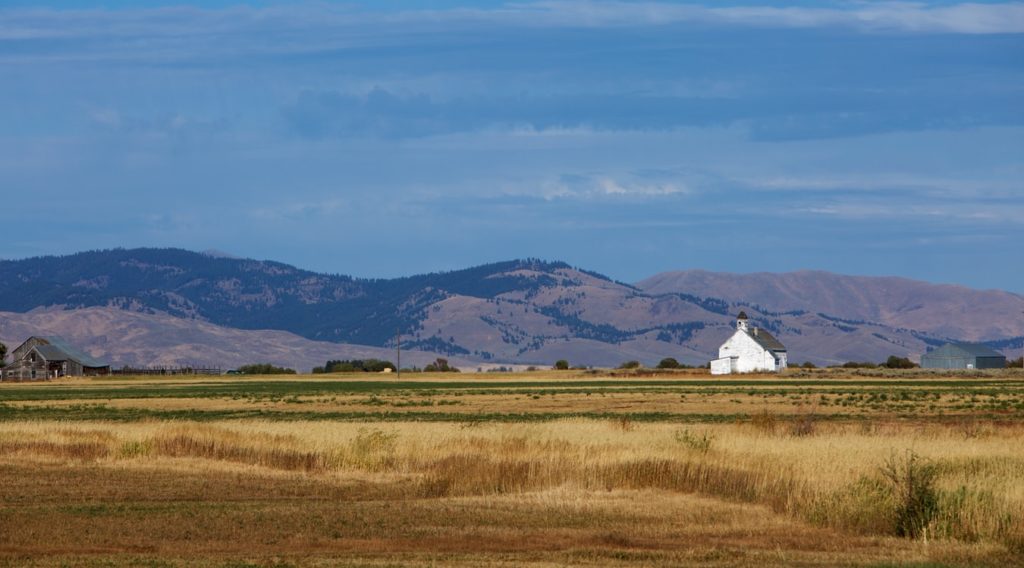
by Eddie Ragsdale
Nestled in a small valley along the Little Red River in the foothills region of the Ozark mountains in Arkansas sits a minuscule municipality named Shirley. This is where I grew up and where my family and I reside today (although, not in the “city” limits). I believe that by anyone’s definition this community would be classified as a rural town with a population fluctuating between 300 and 400 for about one hundred years.
Rural is Relative
The way many people define “rural” and “urban” is somewhat relative. This is even more true when we use ambiguous language such as large, small, big, and little. The difference in how we interpret between hundreds, thousands, and hundreds of thousands reflects our relative experience.
We recently had a brother move from our local church in the town of Marshall, AR (population 1,313) to South Bend, Indiana. As its Mayor was at that time in the news because of his candidacy for the Democratic presidential nomination, I would hear many people referring to South Bend as a ‘small town’. All I could think was how can these people consider a city with 100,000 a small town! Of course, these people live in New York, Chicago, and Los Angeles so in comparison South Bend is a small town.
The ambiguity of the terms “urban” and “rural” can affect our understanding of ministry. For example, if we calculate ministry importance simply in terms of population and ratios then almost no one is maximizing their ministry potential because there always exists somewhere larger with less percentage of gospel impact to which one can go.
No doubt the gospel must penetrate urban centers so that God will be glorified among those who believe and call on the Lord Jesus. However, the same is equally true of the rural areas as well. The Lord is pleased to save all kinds of people in all kinds of places. Why? For His own glory. And, as a point of note for those of us in rural ministry, Paul says that God chose what is foolish in the world to shame the wise and what is weak in the world to shame the strong. He chose the low and despised things in the world….so that no human being might boast in the presence of God. (1 Corinthians 1:26-29)
Towns and Villages
It seems, then, that God delights to do big things in small places. The most obvious scriptural example would be that our God chose the tiny village of Nazareth to be the boyhood home of the Lord Jesus. Could there have been tactical purposes in that he was mostly away from Jerusalem until the time of His ministry? Sure! But it seems that God had a point to prove for the Jews questioned whether anything good could come out of Nazareth. (John 1:46)
Certainly, the ministry of Jesus needed to have an impact in Jerusalem but could you imagine what would be missing if Jesus had not gone throughout the villages of backwater Galilee proclaiming repentance for the kingdom of God is at hand? Jesus even sent His disciples as short term evangelical missionaries to go throughout the towns and villages.
Big Dreams
When most of us begin in ministry we have big dreams. This can be good! We should be ambitious for what God would do in and through us for His own glory. However, it is likely that even if we are “successful” by some outward standard that this success is in relation to the size of the pond in which we find ourselves.
But the true joy and glory of ministry in both rural and urban settings is realized when we understand that what we are ultimately doing is bringing the glorious message of the gospel to individuals and groups who would not have had the same access to the true gospel if God had not ordained for us to be in that place and among those people. Around the world, many places both large and small have a detrimental lack of gospel exposure. (And where many of us minister in rural North America the problem is the all too prevalent access to false or truncated versions of the gospel that appeal to the sentiments and superstitions of the masses even under the name of Christianity.)
The Rural Goal
I have a bit of confession. Early on in my ministry, I was serving in a rural church as the youth minister. The pace was slow and expectations were honestly easy to achieve. I remember pondering that rural ministry could be a comfortable environment in which to serve the Lord.
After a couple of decades of rural ministry, I now have a drastically different view. You see, when I had those thoughts about the relative ease of rural ministry I must admit I lacked a biblical focus on the glory of God. But as I have grown in understanding from God’s word His purposes in saving for Himself a people for His own possession (Titus 2:14) I have realized that those people are both urban city dwellers and rural farmers. Paul goes on in that verse to tell Titus that we who are His own possession are zealous for good works.
The joy of rural ministry is found here, the same as all other ministry, in being zealous for the good works which brings glory to our Father who is in heaven. It may be that we often feel like these things are being done in secret but remember He sees in secret and will reward you (Matt 6:6) with the very thing you are striving for, namely, the joy of glorifying Him.
Eddie serves as pastor to the wonderful saints of First Baptist Church of Marshall, AR. He is married to his lovely wife Laura and has two sons Brady and Corey. He graduated from Williams Baptist University with a B. A. in Religious Education He spends much of his time teaching in various recovery programs focusing on instructing people how to rightly read and interpret the Scriptures. He also serves as Chaplin for Daughters of Hope and Transformation, a residential recovery program in Marshall.
The corporation shall not discriminate against applicants, employees, students, volunteers, and others on the basis of race, color, nationality, or ethnic origin; however, as a religious institution, the corporation reserves the right to deny or terminate employment or to deny or terminate any other status of persons whose lifestyle, words, actions or otherwise do not align with the corporation’s Statement of Faith, standard of conduct, or other policies of this organization.
